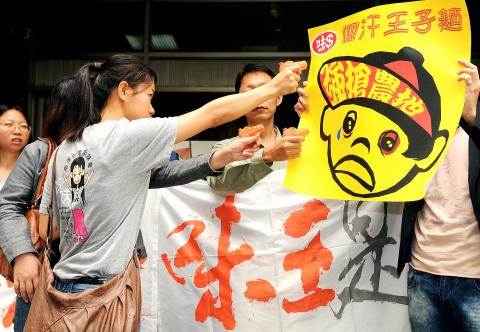Human rights groups yesterday staged a demonstration in front of the headquarters of Ve Wong Corp — a well-known food manufacturer that produces instant noodles, sauces and snacks — in Taipei, protesting against the alleged seizure of farmland in Cambodia by two of the company’s joint ventures.
“The forced seizure of farmland in Cambodia’s Koh Kong Province by Koh Kong Sugar Co Ltd and Koh Kong Plantation Co Ltd is a very well-known case among human rights activists in Southeast Asia,” said Roxanna Chen (陳思穎), a protester who used to work at a human rights organization based in Thailand. “After looking deeper into the case, I realized that a Taiwanese firm was one of the major investors in the two companies and that’s why I think we should take some actions here in Taiwan.”
According to Chen, Ve Wong owns a 30 percent stake in each of the companies operating in Cambodia, with the remainder of both fims owned by the Thailand-based Khon Kaen Sugar Co and Cambodian member of parliament, Ly Yong Phat.

Photo: Chu Pei-hsiung, Taipei Times
Since 2006, Koh Kong Sugar has seized 9,600 hectares of farmland and Koh Kong Plantation took 9,400 hectares to build a sugarcane plantation and a sugar processing plant, Chen said.
Several Cambodian farmers were killed or injured by security personnel dispatched by the companies as they tried to protest the seizure of their farmland, she added.
“I don’t know the law, but I want to say that it’s fine for Ve Wong to make money, but they have no right to do so by hurting others and depriving farmers of their rights,” said Ly Vouch Hang, a Cambodian immigrant who represented the TransAsia Sisters Association Taiwan at the protest.
Taiwan Association for Human Rights’ Policy director Shih Yi-hsiang (施逸翔) said that as a signatory of the UN’s International Covenant on Civil and Political Rights and its International Covenant on Economic, Cultural, and Social Rights, “the government should make sure that all businesses follow the principles laid out in the two covenants, whether operating in Taiwan or abroad.”
In response to the protest, Ve Wong Corp issued a statement saying that while the company holds a 30 percent stake in each of the companies, “our Thai partners are in charge of the daily operations of the companies and have never informed us about what the human rights groups have stated.”

‘DENIAL DEFENSE’: The US would increase its military presence with uncrewed ships, and submarines, while boosting defense in the Indo-Pacific, a Pete Hegseth memo said The US is reorienting its military strategy to focus primarily on deterring a potential Chinese invasion of Taiwan, a memo signed by US Secretary of Defense Pete Hegseth showed. The memo also called on Taiwan to increase its defense spending. The document, known as the “Interim National Defense Strategic Guidance,” was distributed this month and detailed the national defense plans of US President Donald Trump’s administration, an article in the Washington Post said on Saturday. It outlines how the US can prepare for a potential war with China and defend itself from threats in the “near abroad,” including Greenland and the Panama

A magnitude 4.9 earthquake struck off Tainan at 11:47am today, the Central Weather Administration (CWA) said. The hypocenter was 32.3km northeast of Tainan City Hall at a depth of 7.3km, CWA data showed. The intensity of the quake, which gauges the actual effect of a seismic event, measured 4 in Tainan and Chiayi County on Taiwan's seven-tier intensity scale, the data showed. The quake had an intensity of 3 in Chiayi City and County, and Yunlin County, while it was measured as 2 in Kaohsiung, Nantou County, Changhua County, Taitung County and offshore Penghu County, the data showed. There were no immediate reports of

The Chinese Nationalist Party (KMT) is maintaining close ties with Beijing, the Democratic Progressive Party (DPP) said yesterday, hours after a new round of Chinese military drills in the Taiwan Strait began. Political parties in a democracy have a responsibility to be loyal to the nation and defend its sovereignty, DPP spokesman Justin Wu (吳崢) told a news conference in Taipei. His comments came hours after Beijing announced via Chinese state media that the Chinese People’s Liberation Army’s Eastern Theater Command was holding large-scale drills simulating a multi-pronged attack on Taiwan. Contrary to the KMT’s claims that it is staunchly anti-communist, KMT Deputy

RESPONSE: The government would investigate incidents of Taiwanese entertainers in China promoting CCP propaganda online in contravention of the law, the source said Taiwanese entertainers living in China who are found to have contravened cross-strait regulations or collaborated with the Chinese Communist Party (CCP) could be subject to fines, a source said on Sunday. Several Taiwanese entertainers have posted on the social media platform Sina Weibo saying that Taiwan “must be returned” to China, and sharing news articles from Chinese state media. In response, the Mainland Affairs Council (MAC) has asked the Ministry of Culture to investigate whether the entertainers had contravened any laws, and asked for them to be questioned upon their return to Taiwan, an official familiar with the matter said. To curb repeated